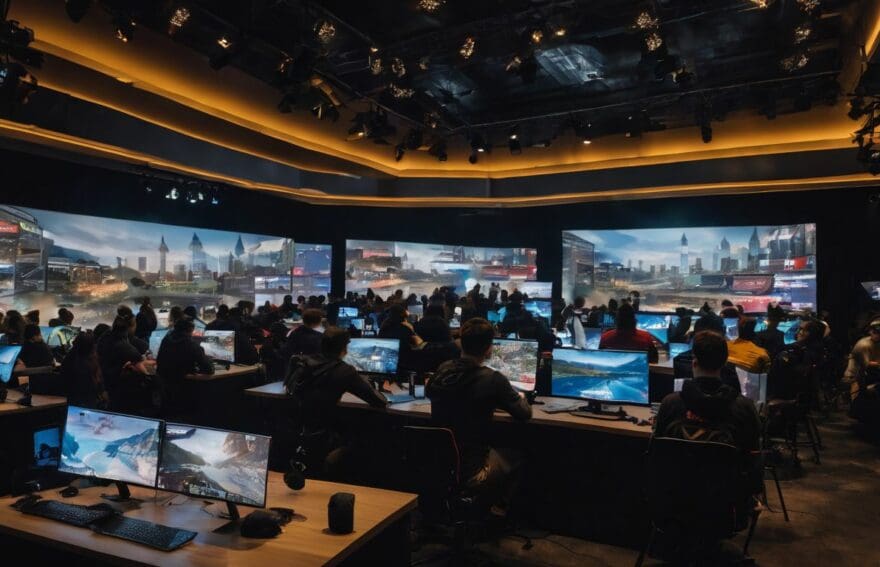The Growth of Mobile Esports: From Arena of Valor to PUBG Mobile

Updated On: October 30, 2025 by James Connolly
Ever caught yourself marveling at how a few casual taps on your mobile screen can transform into an epic quest for victory? We’ve certainly found ourselves drawn into the captivating realm of mobile esports, where millions around the globe are equally enthralled.
Take PUBG Mobile, for example – it’s not just a game; it’s a phenomenon with heart-pounding competitions and bountiful rewards. In this article, we’ll delve into this fascinating world, shining a spotlight on the games that are leading the pack and examining their influence on both avid gamers and industry titans alike.
Brace yourselves – we’re about to peel back the curtain and reveal what lies beyond our screens!
The Rise of Mobile Esports
The rise of mobile esports has been driven by the evolution of mobile gaming and the increasing popularity of competitive gaming. With a global audience and the rise of livestreamed tournaments, mobile esports has become a mainstream part of the online gaming scene.
Evolution of mobile gaming
Mobile games have come a long way since the days of playing Snake on our old phones. We’ve seen them transform from simple, casual experiences to full-blown esports platforms. Big hits like Arena of Valor and PUBG Mobile are at the forefront, showing us just how intense and competitive mobile games can become.
They’ve turned smartphones into portable gaming consoles that challenge players with complex strategies and fast-paced action.
We’re witnessing these games shape a robust competitive scene, drawing in enthusiastic fans from all corners of the globe. As gamers ourselves, we marvel at how titles such as Garena Free Fire have exploded onto the esports stage, attracting millions who watch live-streamed tournaments and take part in massive online battles.
These advancements reflect not only technological progress but also a cultural shift where mobile devices sit center stage in the gaming world’s evolution.
Popularity of competitive gaming
Competitive gaming has surged in popularity, drawing the attention of a diverse global audience. With the rise of mobile esports, games like Arena of Valor and PUBG Mobile have captured the imagination of gamers worldwide.
The market value of competitive gaming content continues to soar, reflecting its increasing appeal across various demographics. As more players participate in mobile esports tournaments, viewership and engagement show no signs of slowing down.
In response to this growing interest, game developers are continuously raising the bar with innovative titles and engaging gameplay experiences, catering to an expanding base of passionate gamers seeking thrilling competition on their smartphones.
The Top Competitors in Mobile Esports
From the fast-paced action of Arena of Valour to the adrenaline-pumping battles in PUBG Mobile, there are plenty of popular titles making waves in the mobile esports scene. These games have not only captured the attention of players but also drawn in a dedicated competitive gaming community.
Arena of Valour
Arena of Valor, also known as Honor of Kings in mainland China, has captured the attention of gamers across Asia with its intense multiplayer online battle arena (MOBA) gameplay. Developed by Tencent Games, it boasts a sizeable player base and is particularly popular in Vietnam and mainland China.
The game’s exciting esports tournaments have contributed to its massive following, solidifying its position as one of the leading titles in the mobile esports scene. Notably, Arena of Valor even had a dedicated version for the Asian Games, highlighting its significance within competitive gaming.
Moreover, Arena of Valor’s success has played a significant role in driving the growth and widespread acceptance of mobile esports globally. With its engaging gameplay mechanics and regular updates that keep players engaged, this title continues to attract novice and passionate gamers alike.
PUBG Mobile
PUBG Mobile, the mobile version of the popular PC game PlayerUnknown’s Battlegrounds, has taken the esports world by storm. Garnering a global audience, PUBG Mobile offers intense battle royale gameplay that challenges players’ strategic thinking and tactical skills.
With its realistic graphics and immersive gameplay experience, PUBG Mobile has become a mainstay in competitive gaming tournaments worldwide.
The game’s popularity also extends to events like the Asian Games, where specific versions have been used for competition. The rise in viewership and engagement demonstrates how PUBG Mobile has contributed to the significant growth of mobile esports.
Other popular titles
Some other popular titles in the mobile esports scene include Garena Free Fire and Clash Royale. Garena Free Fire, a battle royale game, has gained a significant following with its fast-paced gameplay and intense battles.
On the other hand, Clash Royale is a real-time strategy game that combines elements of card games and tower defense, attracting players who enjoy strategic gameplay. Both games have contributed to the expansion of the mobile esports industry by offering unique gaming experiences and engaging competitive scenes.
The diverse range of popular titles in mobile esports showcases the versatility and appeal of competitive gaming on handheld devices. As these games continue to evolve and attract more players, they contribute to the overall growth and excitement within the mobile esports arena.
The Impact of Mobile Esports on the Gaming Industry
The Impact of Mobile Esports on the Gaming Industry has been profound, with a significant increase in revenue and audience engagement. Furthermore, it has influenced mobile game development and led to the rise of professional players within the industry.
Growing revenue and audience
The market value of mobile gaming content has been on the rise worldwide and is expected to continue growing, reaching just under two billion by 2025 as competitive gaming becomes more mainstream.
Mobile esports have seen a rise in viewership and engagement, particularly with the increasing accessibility of smartphones. The explosive growth of mobile esports has been evident, with specific ‘Asian Games versions’ of Arena of Valor and PUBG Mobile being used at events, attracting a global audience and contributing to the growth of the industry.
Influence on mobile game development
Mobile esports have significantly influenced the development of mobile games, driving a higher demand for competitive and multiplayer features. This impact has led to the integration of advanced gameplay mechanics such as real-time strategy, team coordination, and tactical combat in popular titles like PUBG Mobile and Arena of Valor.
The focus on enhancing user experience and engagement has prompted developers to continually innovate and optimise game performance for an increasingly competitive landscape.
The surge in mobile esports has propelled game developers to prioritise regular updates and new content releases, aligning with the evolving preferences of gamers worldwide. As a result, this has created a vibrant ecosystem where mobile gaming experiences continue to push technological boundaries while catering to diverse player skill levels.
Rise of professional players
Mobile esports have given rise to a new breed of professional players, showcasing their skills and expertise in competitive gaming tournaments. With the increasing accessibility of smartphones, many gamers have honed their abilities to compete at a professional level in games like PUBG Mobile, Arena of Valor, and other popular titles.
The global esports market is witnessing the emergence of dedicated teams and individual players who train rigorously to excel in mobile esports competitions. As the industry continues to grow, we anticipate seeing more opportunities for skilled gamers to make a name for themselves as professional players on the mobile gaming scene.
Moving forward into “The Impact of Mobile Esports on the Gaming Industry”, let’s explore how this skyrocketing sector has influenced game development and audience engagement.
Challenges in the Mobile Esports Industry
Infrastructure and connectivity issues can hinder the growth of mobile esports, while the lack of standardisation poses a challenge in creating a level playing field for all players.
To learn more about these challenges and how they are being addressed, keep reading!
Infrastructure and connectivity
To compete in the high-stakes world of mobile esports, robust infrastructure and reliable connectivity are crucial. The demand for fast and stable internet connections is increasing as players engage in intense multiplayer battles on platforms like PUBG Mobile and Arena of Valor.
With the seamless integration of mobile apps into competitive gaming scenes, access to strong network connections becomes a necessity for gamers striving to reach their full potential in this dynamic arena.
As esports titles continue to evolve and attract larger audiences, it’s essential for both seasoned enthusiasts and newcomers to be equipped with the right infrastructure and connectivity.
While elements like responsive touchscreens and powerful processors are important, having a consistent connection that can support real-time gaming interactions remains paramount within this rapidly expanding ecosystem.
This heightened need for reliable infrastructure reflects the growing significance of mobile esports within our interconnected world, reshaping how we experience competitive gaming.
Lack of standardisation
The lack of standardisation in mobile esports rules and regulations poses a challenge for players, teams, and tournament organisers. This inconsistency can lead to confusion and unfair advantages, hindering the growth of the mobile esports industry.
With different standards across various titles, it becomes difficult for gamers to compete on a level playing field. The absence of universal guidelines also presents obstacles for new players entering the scene, making it harder to adapt and succeed.
As we explore the challenges faced by mobile esports, it’s essential to address another critical issue: infrastructure and connectivity.
Balancing competitiveness and inclusivity
To ensure the growth and sustainability of mobile esports, it is essential to balance competitiveness with inclusivity. This means creating an environment where both professional players and casual gamers feel welcome and valued.
Implementing diverse game modes that cater to different skill levels can help bridge this gap, allowing everyone to participate in the competitive scene regardless of their expertise.
Moreover, providing accessible pathways for aspiring players to enter the competitive arena fosters inclusivity while maintaining a high level of competition. By striking this balance, mobile esports can continue to expand its audience base and retain existing enthusiasts while nurturing new talent.
Creating a fair and transparent ecosystem also plays a crucial role in balancing competitiveness with inclusivity in mobile esports. Establishing clear rules, regulations, and standards ensures that all participants have equal opportunities to succeed without compromising on the intensity of competition.
Future of Mobile Esports
The future of mobile esports is extremely promising, with continued growth and potential in the coming years. Emerging trends and technologies are expected to further enhance the gaming experience, while influencing traditional sports and entertainment industries.
Predicted growth and potential
The mobile esports industry is set to see significant expansion in the coming years, with a forecasted global market value of nearly two billion by 2025. As competitive gaming continues to gain mainstream popularity, titles like PUBG Mobile, Garena Free Fire, and Arena of Valor are expected to attract even larger audiences across the globe.
With the increasing accessibility of smartphones and the rise in viewership and engagement, mobile esports are primed for substantial growth and potential impact on the wider gaming and entertainment industries.
Moreover, emerging trends and technologies in mobile esports promise an exciting future for passionate gamers and novice players alike. The development of Asian Games versions for popular titles like Arena of Valor and PUBG Mobile further solidify this trajectory toward continued growth.
Emerging trends and technologies
- Integration of Augmented Reality (AR) and Virtual Reality (VR) features in mobile esports games, creating immersive gaming experiences.
- Implementation of blockchain technology for secure in-game transactions, ensuring transparency and authenticity in the virtual gaming economy.
- Advancements in mobile device hardware, leading to enhanced graphics, smoother gameplay, and increased processing power for a more seamless gaming experience.
- Inclusion of cross – platform compatibility, allowing players on different devices to compete against each other, fostering a more inclusive and diverse gaming community.
- Utilisation of Artificial Intelligence (AI) algorithms for matchmaking and game balancing, optimising player experience by ensuring fair competition and skill-based matchups.
- Development of mobile – specific peripherals such as controllers and accessories tailored for competitive esports gaming on smartphones, offering new ways to enhance gameplay control and precision.
- Incorporation of 5G technology to enable low-latency multiplayer gaming experiences, facilitating real-time communication and enhancing overall performance for competitive mobile gaming.
- Gamification of esports events through interactive live streaming platforms, engaging viewers through real-time participation and immersive fan experiences within the esports ecosystem.
- Adoption of cloud gaming services, allowing players to access high-quality esports titles without the need for high-end hardware, thereby expanding accessibility and reaching broader audiences globally.
Influence on traditional sports and entertainment industries
As mobile esports continue to surge in popularity, their influence is extending beyond gaming and seeping into traditional sports and entertainment industries. The rapid growth of mobile esports has caught the attention of mainstream media, sponsors, and investors.
This shift is reshaping the landscape by providing new opportunities for collaboration and cross-promotion between esports events and established sporting or entertainment activities.
Additionally, the integration of mobile esports into traditional platforms like television broadcasts and live streaming services further blurs the lines between virtual gaming competitions and conventional sporting events.
Conclusion
In conclusion, mobile esports have transformed the gaming landscape, offering a platform for competitive play on a global scale. The rise of titles like Arena of Valor and PUBG Mobile has showcased the potential for mobile gaming to thrive in the esports arena.
As new technologies emerge and audiences grow, the future holds great promise for further expansion and innovation in the mobile esports industry. With increasing accessibility and engagement, it is evident that mobile esports are here to stay as formidable contenders in the world of competitive gaming.
FAQs
1. What is mobile esports, and how has it grown?
Mobile esports is competitive gaming on smartphones or tablets that has seen a significant rise in popularity with games like Arena of Valor and PUBG Mobile leading the way.
2. Can I join multiplayer online battle arena (MOBA) games on my phone?
Yes, you can play MOBA games such as Arena of Valor on your mobile device and compete against other players online.
3. Are there big tournaments for mobile esports like there are for console and PC gaming?
Absolutely! There are major global tournaments for mobile esports where players showcase their skills in games including PUBG Mobile.
4. Has the success of certain titles influenced the growth of mobile esports?
Definitely, hit titles like PUBG Mobile have propelled the growth of mobile esports by attracting millions of gamers worldwide to participate in this digital sporting phenomenon.



